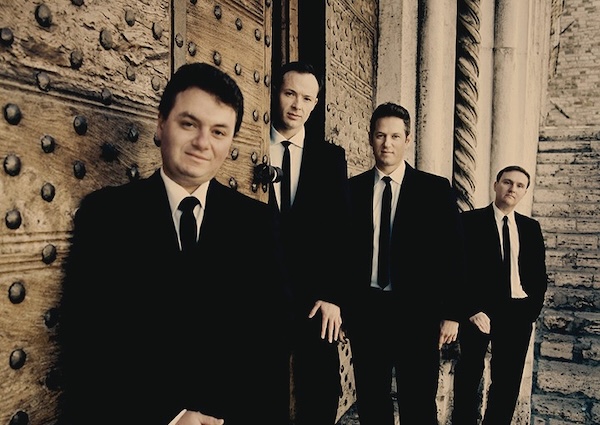Concert Review: The Jerusalem Quartet Balances Lyricism and Vitality
By Aaron Keebaugh
The performance of the Jerusalem Quartet was marked by considerable poise, polish, and personality.

The Jerusalem Quartet. Photo: courtesy of the artist
The concluding moments of Dmitri Shostakovich’s String Quartet No. 12 are unmistakable. Following nearly half an hour of wayward dissonance and sardonic lyricism, the music cries out with sudden optimism. But it’s an unsettled culmination — satisfying yet darkly insistent. And this is true to form. Shostakovich’s artistry, after all, excels at keeping listeners in a state of uncertainty, providing little sense of resolution, let alone solace.
This is a musical journey that has tried the powers of even the most celebrated string quartets. Some, like the Emerson Quartet, lean into the bleakness by making the ending feel bold, sudden, and surprising. But the Jerusalem Quartet, who offered Shostakovich’s score in their Celebrity Series concert this past weekend, took another strategy: an inviting warmth. Yes, the work retained its general pessimism, but the Jerusalem musicians generated just enough confidence and cheer to keep the composer’s torturous sorrows at arm’s length.
Composed in 1968, the string quartet served as an expressive vessel into which the composer poured his pain and anxiety. He was then suffering from the heart ailment that would claim his life. Tapping into that stark reality demanded a new language, and the composer delved into the 12-tone techniques then so prominent among the Western avant-garde. Yet he didn’t stray too far into the sonic thorns and thickets: Shostakovich opens the score with a tone row, but the music soon settles into an astringent tonality, searching yet never quite finding a way out of the emotional quagmire.
In Friday’s performance, cellist Kyril Zlotnikov generated a ghostly resonance as the rest of the Jerusalem Quartet drew deft silvery lines. They tended to avoid the timbral grain that typically marks readings of this score. That approach made the fugal sections feel a little prickly, but never crass.
Their ensemble sound took on a greater edge, engendering furious intensity, in the second movement. Glissandos and attacks took on Bartókian sting. But here too, they steered clear of mordant self-indulgence, softening their tone just as suddenly to convey a hint of assurance. The result was a sound that was personal, even tender, amidst the gloom.
Antonin Dvořák’s String Quartet No. 13, Op. 106 served as a fitting palate-cleanser. Begun in 1894 during Dvořák’s final year in America but completed in Prague, the quartet comes off as a robust homecoming, buoyed by an uplifting demeanor and unyielding vitality.
The Jerusalem Quartet channeled that sprightliness by leaning into every sudden emotional shift. The music danced one moment and sang the next, at times rowdy, even joyous, to the point of ecstasy. Dusky lyricism in the second movement momentarily interrupted the party. But fervent zest returned in the Scherzo, with the musicians performing with the verve that would loosen up a village jam session. The finale, taken at whip-crack tempo, brought it all to a dramatic conclusion.
That high-wire act, between driving rhythm and timbral grandeur, made Haydn’s String Quartet Op. 50, No. 1, the concert’s opener, feel like the best of two worlds.
The first of Haydn’s “Prussian Quartets,” this work doesn’t quite possess the standout power of the “The Dream” and “The Frog” from Op. 50. But the musicians treated it like the refreshing classic it is, exploring with biting vigor Haydn’s surprising key changes and elaborate wit. Yet they moved with a keen sense of direction and momentum — the effect was as much Beethovenian as Haydnesque. Leaning into the former made the second movement flow like a dance while the Minuet and finale coursed with live-wire energy. Through all the drama, the Jerusalem Quartet never lost its feel for the sheer sonic beauties of the piece. They tore into the music and made it sing.
Two encores set the air spinning with just as much lyricism and grace. The Adagio from Haydn’s String Quartet, Op. 20, No. 5 and the Canzonetta from Mendelssohn’s String Quartet Op. 12 put the finishing touches on a performance marked by considerable poise, polish, and personality.
Aaron Keebaugh has been a classical music critic in Boston since 2012. His work has been featured in the Musical Times, Corymbus, Boston Classical Review, Early Music America, and BBC Radio 3. A musicologist, he teaches at North Shore Community College in both Danvers and Lynn.
